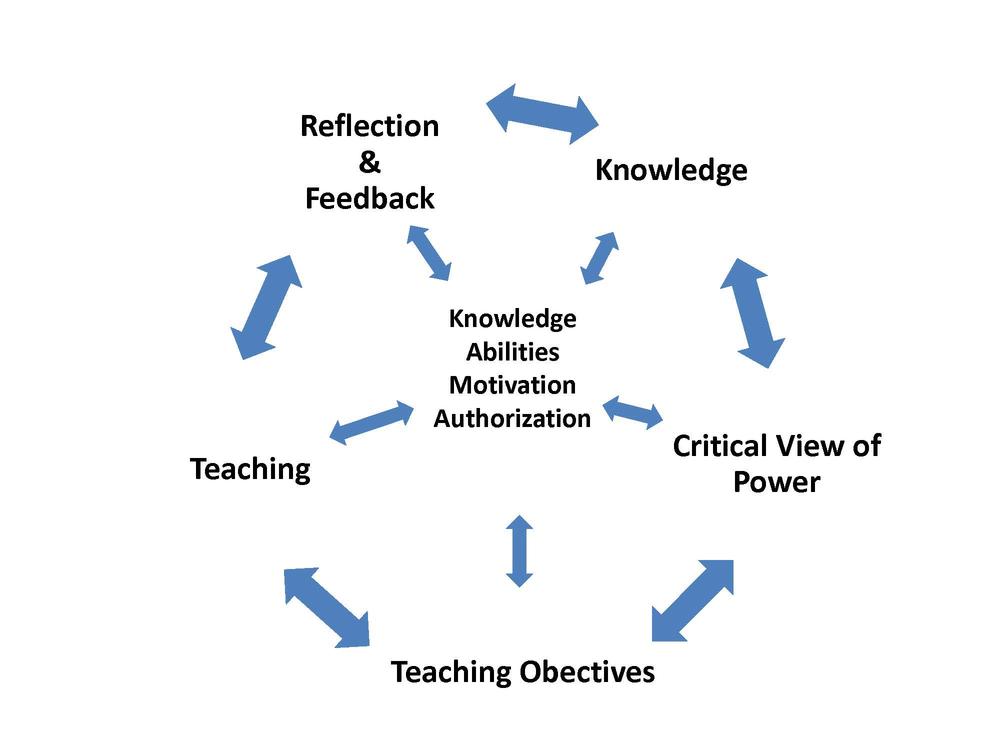Teaching Skills
Skills Acquisition Cycle
Gender and Diversity Skills for University Teachers
To teach well, lecturers need a wide range of skills. In addition to specialized skills, communication skills, and methodological skills, these also include skills in gender and diversity that are closely linked to all the other skill sets.
Lecturers are not automatically equipped with these skills. If you want to incorporate aspects of gender and diversity more firmly in your teaching and develop greater sensitivity to anti-discrimination and participatory communication (motivation), you can gradually expand the capabilities you need to do so in your teaching. This page describes how the process of skills development can progress. The following illustration summarizes this cycle:
Building on your own specialized and methodological expertise (knowledge and abilities) and the specifications of the study and examination regulations (authorization), you can review and determine which of your learning objectives for your teaching relate to gender and diversity. Take your aspired learning objectives as the basis for your course planning. As you conduct your class, take notes on the aspects that seem to have gone well or that posed difficulties for you or your students. Based on your notes and your students’ feedback, using questions for reflection such as those in the Evaluation of Methods or the checklist, you can go over your plan, the progress, and the results of your course, keeping successful aspects, and devising alternatives to any problematic aspects. When you relate your new experiences to new specialized and methodological knowledge, you will be able to develop an attitude that takes a critical view of power and pays attention to gender and diversity.
You can apply your experiences and reflections to your future teaching.
By nature, this process is never complete. As you continually gather experience, the cycle repeats itself. Aspects of gender and diversity play a role in every stage of the process.
You can familiarize yourself with gender and diversity skills in the Guidelines section and on the Course Content and Methods pages.
Skills and competences
Here are various aspects to consider as you think about ways to expand your teaching skills.
To shed light on the development of gender and diversity issues, teach your students about the academic history of your field and its interdisciplinary relationships with other fields. You often need a reflective relationship with your own field’s culture to avoid excluding people and to invite change – even in your own teaching. Deliberately seek out questions in your field with relevance to Gender and Diversity Studies, such as criticism of science, debates over research methods ...
You are used to preparing your lessons thoroughly. Part of gender- and diversity-conscious lesson planning is preparation oriented to both the learning goals and the audience: Who are the students who attend your course? What are their learning goals and motivations? What learning goals should be achieved in the course according to the program regulations? What methods can you use to be as aware of gender and diversity in your teaching as possible? How can you shape the communication in ...
Developing your gender- and diversity-conscious communication skills also means paying special attention to discrimination in communication situations . This improves your ability to notice discriminatory language used by yourself and others and to offer alternatives. Communication situations can improve when everyone involved understands how a statement can change “in transit” between the sender to the recipient and realizes the role of the power structures within which ...
A good sense of your own (social) position and your role as a lecturer can help make you more self-aware of your (power) relationships with others. Many hierarchical interactions are perpetuated through day-to-day behavior. This also occurs during teaching, for example, either due to unconscious distinctions that lead to treating male and female students unequally, or also to deliberately racist remarks. An important prerequisite for change is your desire and willingness to enact it. If ...
AK ProNa. 2015. Mein Name ist_, Mein Pronomen ist_.
Arbeit und Leben - DGB/VHS (Hrsg.): Institutionelle Gender Analyse – Arbeitshilfe zur Organisationsentwicklung von Bildungseinrichtungen im Kontext von Gender Mainstreaming.
Aulenbacher, Brigitte, und Birgit Riegraf, Hrsg. 2009. Erkenntnis und Methode. Geschlechterforschung in Zeiten des Umbruchs. Wiesbaden: VS Verlag für Sozialwissenschaften.
Blickhäuser, Angelika, und Henning von Bargen. 2007. Leitfaden zur Gender-Analyse von Organisationen Hrsg. Fit for Gender Mainstreaming.
Czock, Heidrun, Dominik Donges, und Susanne Heinzelmann. 2012. Diskriminierungsfreie Hochschule - Mit Vielfalt Wissen schaffen. Endbericht zum Projekt. Hrsg. Antidiskriminierungsstelle des Bundes. Berlin.
Czollek, Leah C., und Gudrun Perko. 2008. Eine Formel bleibt eine Formel… Gender- und diversitygerechte Didaktik an Hochschulen: Ein intersektionaler Ansatz. Wien.
Czollek, Leah Carola, und Gudrun Perko. 2015. Eine Formel bleibt eine Formel … Gender/queer- und diversitygerechte Didaktik an Hochschulen: ein intersektionaler Ansatz (überarbeitete und ergänzte Auflage). Wien.
Debus, Katharina. 2012. Methodenplanung und –auswertung. Portal Intersektionalität.
Freikamp, Ulrike et al. 2008. Kritik mit Methode? Forschungsmethoden und Gesellschaftskritik. Berlin.
Goel, Urmila. 2016. Die (Un)Möglichkeit der Vermeidung von Diskriminierungen. In Diskriminierungskritische Lehre. Denkanstöße aus den Gender Studies, Hrsg. Geschäftsstelle des Zentrums für transdisziplinäre Geschlechterstudien der Humboldt-Universiät zu Berlin.
Kaschuba, Gerrit. 2004. Von der Wundertüte zum kontrollierten Einsatz? Anregungen zur prozessorientierten Entwicklung von Qualitätskriterien für Gender Trainings. In Geschlechterverhältnisse bewegen: Erfahrungen mit Gender Training, Hrsg. Netzwerk Gender-Training, 117–135. Königstein/Taunus: Helmer.
Kuria, Emily Ngubia, Hrsg. 2015. eingeschrieben. Zeichen setzen gegen Rassismus an deutschen Hochschulen. 1. Aufl. Berlin: w_orten & meer.
Mecheril, Paul. 2013. „Kompetenzlosigkeitskompetenz“. Pädagogisches Handeln unter Einwanderungsbedingungen. In Interkulturelle Kompetenz und pädagogische Professionalität, vol. 13, Interkulturelle Studien, Hrsg. Georg Auernheimer, 15–35. Wiesbaden: VS Verlag für Sozialwissenschaften.
Metz-Göckel, Sigrid, und Christine Roloff. 2002. Genderkompetenz als Schlüsselqualifikation. Journal Hochschuldidaktik 7–10.
Middendorff, Elke, Beate Apolinarski, Jonas Poskoswky, Maren Kandulla, und Nicolai Netz. 2014. 20. Sozialerhebung - Wirtschaftliche und soziale Lage der Studierenden. Hrsg. Deutsches Studentenwerk und BMBF.
Perko, Gudrun, und Dorothea Kitschke. 2014. Kompetenzmessung in der Hochschullehre? Eine Studie über die Vermittlung und Einschätzung von Gender/Queer- und Diversity-Kompetenzen für soziale Berufe im Hochschulkontext. 1. Aufl. Weinheim: Beltz Juventa.
Projekt Lern- und Erinnerungsort Afrikanisches Viertel (LEO) beim Amt für Weiterbildung und Kultur des Bezirksamtes Mitte von Berlin und Elina Marmer (Hrsg.): Rassismuskritischer Leitfaden.
Rosenkranz-Fallegger, Edith. 2009. Genderkompetenz: Eine theoretische und begriffliche Eingrenzung. In Handbuch Gender-Kompetenz: Ein Praxisleitfaden für (Fach-)Hochschulen, Hrsg. Brigitte Liebig, Edith Rosenkranz-Fallegger, und Ursula Meyerhofer, 29–48. Zürich: vdf Hochschulverlag.
Sauer, Arn, und Jannik Franzen. 2010. Benachteiligung von Trans*Personen, insbesondere im Arbeitsleben. Berlin.
Schumacher, Eva-Maria. 2011. Schwierige Situationen in der Lehre: Methoden der Kommunikation und Didaktik für die Lehrpraxis. 1. Aufl. Opladen [u.a.]: Budrich.
Singer, Mona. 2010. Feministische Wissenschaftskritik und Epistemologie: Voraussetzungen, Positionen, Perspektiven. In Handbuch Frauen- und Geschlechterforschung. Theorie, Methoden, Empirie, Hrsg. Ruth Becker und Beate Kortendiek, 292–301. Wiesbaden: VS Verlag für Sozialwissenschaften.
Smykalla, Sandra. 2006. Was ist Gender? Hrsg. Genderkompetenzzentrum.
Smykalla, Sandra. 2010. Die Bildung der Differenz: Weiterbildung und Beratung im Kontext von Gender Mainstreaming. Wiesbaden: VS Verlag für Sozialwissenschaften.
Towfigh, Emanuel, Christian Traxler, und Andreas Glöckner. 2014. Zur Benotung in der Examensvorbereitung und im ersten Examen. Eine empirische Analyse. Zeitschrift für Didaktik der Rechtwissenschaft.
Wegner, Elisabeth, und Matthias Nückles. 2012. Mit Widersprüchen umgehen lernen: Reflektiertes Entscheiden als hochschuldidaktische Kompetenz. In Lernwelt Universität. Entwicklung von Lehrkompetenz in der Hochschullehre, vol. 9, Lernweltforschung, Hrsg. Marianne Merkt und Rudolf Egger, 61–81. Wiesbaden: VS Verlag für Sozialwissenschaften.
West, Candace, und Sarah Fenstermaker. 1995. Doing Difference. Gender & Society, 9(1), 8–37
Links:
Antidiskriminierungsstellen des Bundes.
Berliner Zentrum für Hochschullehre.
Dezentralen Frauenbeauftragten der Fachbereiche der FU Berlin.
Initiative intersektionale Pädagogik.
Landesstelle für Gleichbehandlung – gegen Diskriminierung.
Leidmedien.de. Über Menschen mit Behinderung berichten.
Margherita-von-Brentano-Zentrum.
Online-Tool zur Selbstevaluation und Weiterbildung der Universität Freiburg.
Schulz von Thun: Das Kommunikationsquadrat.
Self-Assesment-Tool des Projekts DiVers der Universität zu Köln und der RWTH Aachen.
Version 2025. Unless otherwise indicated, all original content on this website is protected by copyright and licensed under Creative Commons Attribution-NonCommercial-ShareAlike 4.0 International.


